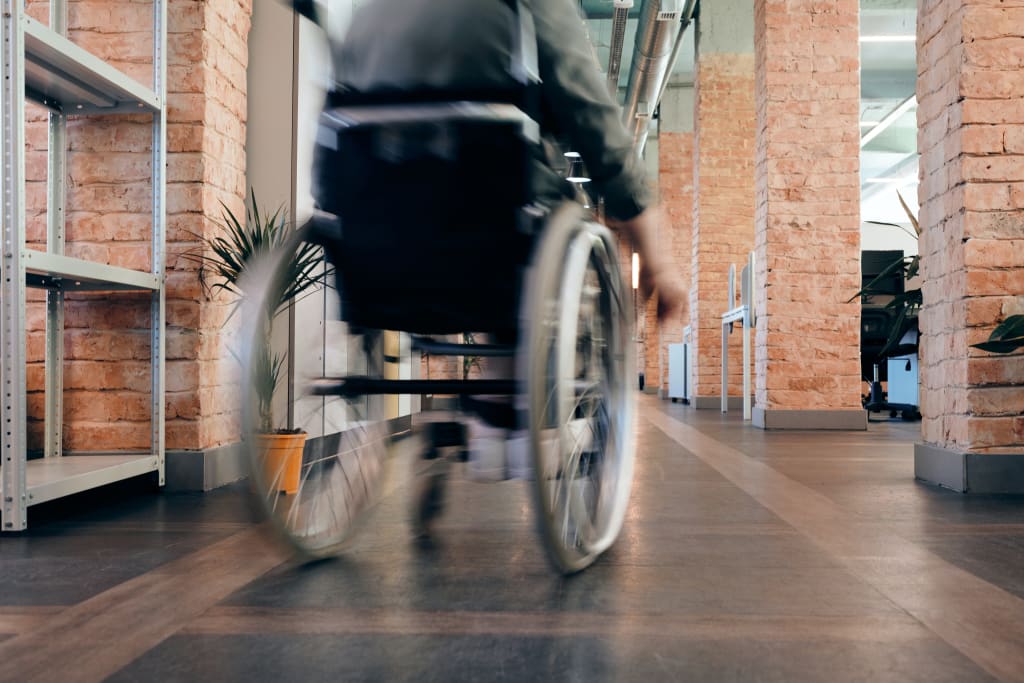Madison Cawthorn Does Not Represent the Disabled Community
Madison Cawthorn's Ableism

When I watched Madison Cawthorn stand up from his wheelchair at the Republican National Convention, I saw a part of myself. I was born with cerebral palsy. I now am a 23-year-old freelance writer with two Bachelor’s degrees: one in Classical Civilizations and the other in Writing. I write mostly about disability and mental health, but that hasn’t always been the case. For years, I struggled unknowingly with internalized ableism. Internalized ableism is when Disabled people (often unconsciously) internalize the biases our society has towards Disabled people. My internalized ableism contributed to a nearly decade-long eating disorder, and made me deny a part of my identity. I now write about mental health and disability unapologetically because I see my disability as an asset instead of a hindrance.
I spent years pushing my body to its limits because I believed that was the only way to prove I was just as valuable as my able-bodied peers. Fortunately for me, my actions were never broadcasted on the national stage. The same cannot be said about Cawthorn. He symbolically “overcame” his disability during a national convention. I put the word “overcame” in quotes because for many Disabled people, overcoming their disability is not possible, and for many of us, overcoming isn’t the goal. Quadriplegics may not be able to stand up even with assistance, and that is okay.
Cawthorn’s spectacle was reminiscent of Christopher Reeve and his desire to walk again. Mary Johnson’s book Make Them Go Away, details Reeve’s insistence that his life would be better once he could walk again. He even starred in a Super Bowl ad where he was shown “walking” for the first time since the accident that left him paralyzed. The same way Reeve “[rose] from his wheelchair at a…gala to accept an award” for a Nuveen ad, Cawthorn rose with the support of two men at the Republican National Convention to prove that with determination, Disabled people can “overcome” their disabilities and conform to an able-bodied standard. Reeve never did walk again, but perhaps the real tragedy was that he spent his years lamenting a past and hoping for a different future rather than immersing himself in the Disabled community and learning to accept himself. I cannot comment on whether or not Cawthorn accepts himself, but I can say that an obsession with walking and “overcoming” one’s disability harms the Disabled community. In the end, spectacles do not benefit Disabled people, but combatting ableism and fighting for Disabled people’s ability to live and thrive in their communities does.
I wish Cawthorn used his platform to undermine ableism by showing his political party that not everyone can stand, and that is okay. I wish he showed the GOP that it is okay to be Disabled. I wish he acted as a role model to Disabled children, showing that he doesn’t have to perform able-bodiedness in order to be a leader. He can lead just as efficiently from a chair. There is enough pressure on Disabled children without having someone like Cawthorn standing and catering to able-bodied norms.
I wish he didn’t use his disability as a ploy for division (pitting himself against Colin Kaepernick who famously knelt). Cawthorn failed to realize that many Black Disabled folks are rightfully fearful of the police. An article from Time Magazine highlights that Black Disabled people are at an elevated risk of police violence. It is widely understood in America that kneeling or sitting during the pledge or National Anthem is a way to silently protest police brutality against Black people in this country. Cawthorn is aware of this, yet he chose to weaponize his disability by showing the exertion it takes for him to stand, shaming nondisabled people and Disabled people alike who kneel or sit.
Cawthorn chose to make a spectacle of his disability, to pit himself against others, and in a sense, say, “If a man in a wheelchair can do it, why can’t you?” But Cawthorn does not represent the gamut and diversity of disability in America. He is white, cisgender, has the use of his upper body, and has no difficulty speaking. He cannot demand that someone with no use of their limbs stand with him. He cannot demand that Black Disabled people stand for a country that routinely devalues their lives. He used his privilege and platform to counter protests. Instead of empathizing with Black Disabled folks, he snuffed them, saying, “If I can do it, what’s your excuse?” failing to recognize that his white skin shields him from many of the biases Black Disabled people face on a daily basis. By him standing, he told them he doesn’t care about their fear and pain, or perhaps worse, that he won’t even acknowledge it.
I am angry that he made a spectacle of his disability. I am angry because that is what I have been fighting against for years. I am no less valuable when I am sitting than I am when I am standing. My body is not a spectacle for abled eyes; it is not a symbol of human perseverance. How I choose to get around has no reflection on my value as a human being. Madison Cawthorn needs to understand that by catering to nondisabled Republicans will only harm him. When we try to “overcome” our disabilities to be accepted by able-bodied society, we will never truly gain acceptance. Acceptance with a caveat is not acceptance. If the GOP does not accept Cawthorn in his chair, they do not accept him at all.
2021 updates: Madison Cawthorn won his election and is now the Representative for North Carolina's 11th district. But his racist and ableist tirades have not ended. Most recently, Cawthorn spouted claims that the US Capitol rioters were paid by the Democratic Party to make former president Trump "look bad." He has also perverted his disability to deny multiple sexual assault allegations. However, under normal circumstances, Cawthorn refuses to be associated with the Disabled community.
About the Creator
Erica Mones
Bylines in The Progressive, PopSugar, Well + Good, New Mobility, Rooted in Rights, Audacity Magazine, and Cripple Magazine. Disability and mental health advocate.
Enjoyed the story? Support the Creator.
Subscribe for free to receive all their stories in your feed. You could also pledge your support or give them a one-off tip, letting them know you appreciate their work.






Comments
There are no comments for this story
Be the first to respond and start the conversation.